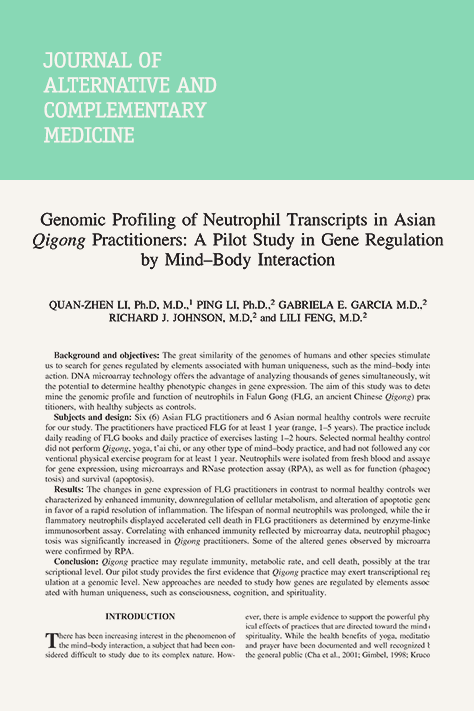By The Journal of Alternative and Complementary Medicine, 2005
QUAN-ZHEN LI, Ph.D, M.D., PING LI, Ph.D., GABRIELA E. GARCIA M.D., RICHARD J. JOHNSON, M.D, and LILI FENG, M.D.
Background and objectives: The great similarity of the genomes of humans and other species stimulated us to search for genes regulated by elements associated with human uniqueness, such as the mind–body inter-action. DNA microarray technology offers the advantage of analyzing thousands of genes simultaneously, with the potential to determine healthy phenotypic changes in gene expression. The aim of this study was to deter-mine the genomic profile and function of neutrophils in Falun Gong (FLG, an ancient Chinese Qigong) practitioners, with healthy subjects as controls.
Subjects and design: Six (6) Asian Falun Gong practitioners and 6 Asian normal healthy controls were recruited for our study. The practitioners have practiced Falun Gong for at least 1 year (range, 1–5 years). The practice includes daily reading of Falun Gong books and daily practice of exercises lasting 1–2 hours. Selected normal healthy controls did not perform Qigong, yoga, t’ai chi, or any other type of mind–body practice, and had not followed any conventional physical exercise program for at least 1 year. Neutrophils were isolated from fresh blood and assayed for gene expression, using microarrays and RNase protection assay (RPA), as well as for function (phagocytosis) and survival (apoptosis).
Results: The changes in gene expression of Falun Gong practitioners in contrast to normal healthy controls were characterized by enhanced immunity, down regulation of cellular metabolism, and alteration of apoptotic genes in favor of a rapid resolution of inflammation. The lifespan of normal neutrophils was prolonged, while the inflammatory neutrophils displayed accelerated cell death in Falun Gong practitioners as determined by enzyme-linked immunosorbent assay. Correlating with enhanced immunity reflected by microarray data, neutrophil phagocytosis was significantly increased in Qigong practitioners. Some of the altered genes observed by microarray were confirmed by RPA.
Conclusion: Qigong practice may regulate immunity, metabolic rate, and cell death, possibly at the transcriptional level. Our pilot study provides the first evidence that Qigong practice may exert transcriptional regulation at a genomic level. New approaches are needed to study how genes are regulated by elements associated with human uniqueness, such as consciousness, cognition, and spirituality.




